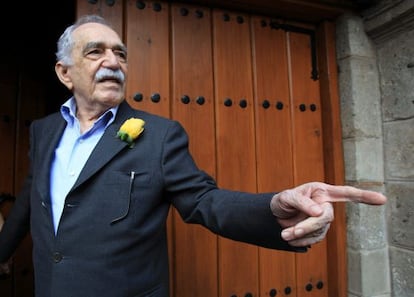Literary giant Gabriel Garc¨ªa M¨¢rquez dies in Mexico City at age 87
Nobel Prize-winning novelist had been receiving palliative care at his home Colombian-born writer is considered one of the greatest authors of the 20th century

Gabriel Garc¨ªa M¨¢rquez, the Nobel Prize-winning author whose novel One Hundred Years of Solitude is considered one of the finest works of 20th-century literature, died on Thursday at his home in Mexico City. He was 87.
His death came just days after the Colombian author¡¯s family acknowledged that he was in ¡°delicate health¡± after the Mexico City daily El Universal reported that he was receiving palliative care. The Colombian government, however, had denied El Universal¡¯s report that he was dying from lymphoma, a disease he had been suffering from for the past decade.
A private man, Garc¨ªa M¨¢rquez complained about the media coverage during a stay at a hospital where he was treated, according to his son, for a respiratory infection in late March.
Besides One Hundred Years of Solitude, his greatest works include Autumn of the Patriarch, Love in the Time of Cholera and The General in his Labyrinth.
¡°One Hundred Years¡± is required reading for Latin American students
Born in Aracataca, on Colombia¡¯s Caribbean coast, on March 6, 1927, ¡°Gabo,¡± as he was known throughout his life, spent his childhood growing up in his grandparents¡¯ house. The eldest of 11 children, he attended school in Barranquilla and received a scholarship in 1940 to continue his studies in Zipaquir¨¢, where he graduated from the Colegio Nacional. He was selected to speak at the graduation ceremonies.
Influenced by Kafka and Joyce, he made his literary debut in 1947 with La tercera resignaci¨®n (The Third Resignation). At the time, he was studying law and political science at Colombia¡¯s National University.
But it was his 1967 novel One Hundred Years of Solitude ¨C about the trials and tribulations of the generations of the fictional patriarchal Buendia family ¨C that won the most acclaim, and is perhaps considered his best work. It has been translated into more than 30 languages and is required reading for students throughout Latin America.
He dabbled in journalism, working for El Espectador in Bogota and El Universal in Cartagena for brief periods. In 1958 he married Mercedes Barcha, who survives him along with their two sons, Rodrigo and Gonzalo.
His fame as a writer grew considerably following One Hundred Years of Solitude. He became a life-long friend of Cuba¡¯s Fidel Castro and often defended him in public forums.
In 1972, he was awarded the prestigious R¨®mulo Gallegos Prize. But 10 years later, more people around the world came to know him when he was given the Nobel Prize for Literature.
Two of his last novels, News of a Kidnapping (1996) and Memories of My Melancholy Whores (2004), as well as his autobiography Living to Tell the Tale (2002), were all well received and also translated into different languages.
He had been living for the past three decades in the affluent Mexico City suburb of San ?ngel, which is where he passed away.
Tu suscripci¨®n se est¨¢ usando en otro dispositivo
?Quieres a?adir otro usuario a tu suscripci¨®n?
Si contin¨²as leyendo en este dispositivo, no se podr¨¢ leer en el otro.
FlechaTu suscripci¨®n se est¨¢ usando en otro dispositivo y solo puedes acceder a EL PA?S desde un dispositivo a la vez.
Si quieres compartir tu cuenta, cambia tu suscripci¨®n a la modalidad Premium, as¨ª podr¨¢s a?adir otro usuario. Cada uno acceder¨¢ con su propia cuenta de email, lo que os permitir¨¢ personalizar vuestra experiencia en EL PA?S.
?Tienes una suscripci¨®n de empresa? Accede aqu¨ª para contratar m¨¢s cuentas.
En el caso de no saber qui¨¦n est¨¢ usando tu cuenta, te recomendamos cambiar tu contrase?a aqu¨ª.
Si decides continuar compartiendo tu cuenta, este mensaje se mostrar¨¢ en tu dispositivo y en el de la otra persona que est¨¢ usando tu cuenta de forma indefinida, afectando a tu experiencia de lectura. Puedes consultar aqu¨ª los t¨¦rminos y condiciones de la suscripci¨®n digital.








































